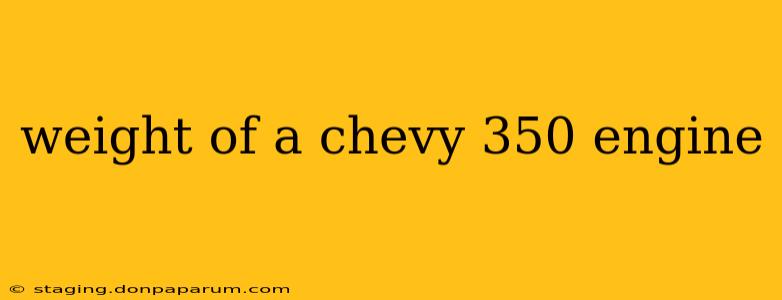The Chevrolet 350 small-block V8 engine, a legendary powerplant in automotive history, has seen numerous iterations over the decades. Therefore, pinpointing the exact weight requires understanding the specific year of manufacture and any modifications. This guide will delve into the typical weight ranges, factors influencing variations, and provide valuable context for anyone curious about this iconic engine's mass.
Understanding the Weight Variations
The weight of a Chevy 350 engine isn't a single, definitive number. Several factors significantly impact its overall mass:
-
Year of Manufacture: Earlier models, especially those from the 1960s and 70s, often weighed slightly more due to differences in casting materials and manufacturing techniques. Later models, benefitting from advancements in materials science, might be marginally lighter.
-
Specific Engine Components: The inclusion or exclusion of certain components, such as the alternator, starter motor, air conditioning compressor, and various brackets, all contribute to the total weight. A bare block will weigh considerably less than a fully dressed engine ready for installation.
-
Casting Materials: The materials used in the engine block and heads impact weight. Aluminum components, for instance, are significantly lighter than their cast iron counterparts. While predominantly cast iron, some variations utilized aluminum heads, resulting in a noticeable weight difference.
-
Modifications and Aftermarket Parts: Custom modifications, performance upgrades, and aftermarket parts can drastically alter the engine's weight. High-performance components might be lighter or heavier depending on the materials used.
Typical Weight Ranges
While precise figures vary, a generally accepted weight range for a complete, ready-to-install Chevy 350 small-block V8 engine is between 450 and 550 pounds (approximately 204 to 249 kg). This encompasses a wide variety of models and configurations.
Breaking Down the Components:
It's useful to consider the weight distribution across major components:
- Engine Block: A substantial portion of the total weight.
- Cylinder Heads: Contribute significantly to the overall mass.
- Crankshaft, Pistons, and Connecting Rods: These internal components add considerable weight.
- Accessories: The alternator, starter, power steering pump, and other accessories account for a notable portion of the total weight.
Why Knowing the Weight Matters
Understanding the weight of a Chevy 350 engine is crucial for several reasons:
- Vehicle Modifications: Accurate weight calculations are vital when planning engine swaps or modifications to ensure proper vehicle balance and handling.
- Shipping and Transportation: Knowing the weight is essential for determining appropriate shipping costs and handling techniques.
- Structural Considerations: The weight of the engine needs to be factored into the structural design and reinforcement of the vehicle's chassis.
Finding a More Precise Weight
For the most accurate weight of a specific Chevy 350 engine, the best approach is to:
- Consult the engine's specifications: If you have the exact model year and build code, the manufacturer's specifications might provide the exact weight.
- Weigh the engine: The most accurate method is to weigh the engine itself using a suitable scale.
- Reference online forums: Dedicated automotive forums and online communities can be valuable resources for finding weight information related to specific configurations.
In conclusion, while a precise weight for a Chevy 350 engine is difficult to give without specific details, understanding the typical weight range and the factors influencing variations provides valuable context. Using the guidelines provided, you can arrive at a reasonably accurate estimate for your specific application.

